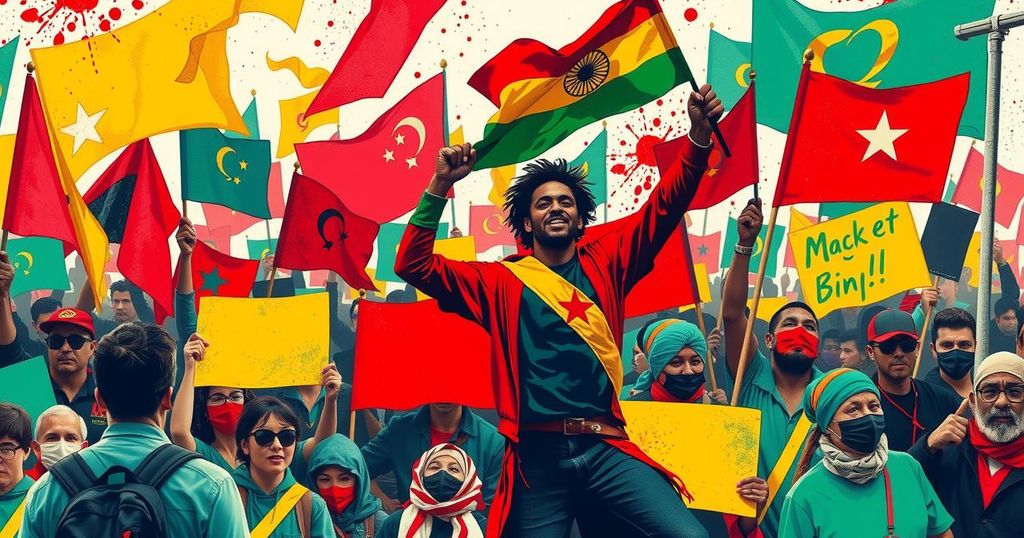Iran Protests Continue Amid Widespread Discontent and International Advocacy
Iran sees renewed protests from retirees and workers expressing discontent while international exhibitions highlight government human rights abuses. Legal proceedings are slated for Iranian spies in the UK, reflecting broader implications of Iran’s internal conflict. Public safety continues to decline as tragic murders underscore systemic failures in governance.
Iran is witnessing a resurgence of public protests, with seniors, laborers, and even boat owners expressing their discontent over the regime’s failing policies and rampant corruption. Throughout late May and early June, residents across various cities rallied against the economic turmoil that has plagued the nation, signaling that the populace is unwilling to accept the status quo, no matter the intimidation from the authorities.
On June 6, Resistance Units took notable action in Zahedan. This city, already under tight security and oppressive control, was the backdrop for significant activities aimed at challenging the regime’s fear-inducing tactics. The resistance comes at a particularly dangerous time since the regime has ramped up executions, targeting influential individuals linked to the People’s Mojahedin Organization of Iran (PMOI/MEK).
In international efforts, supporters of the PMOI/MEK have organized several exhibitions across Europe. One held in Bucharest on June 7 spotlighted the regime’s human rights violations, especially the alarming increase in death sentences issued against political prisoners. Similarly, a protest in Rostock, Germany, drew attention to the regime’s escalating brutality, with calls for the immediate release of detainees and demands for international prosecutions against the Iranian leadership for crimes against humanity.
Likewise, the Berlin exhibition condemned the Iranian regime’s actions while urging global support in the face of these growing human rights abuses. Another exhibition took place in Bern, Switzerland, also highlighting the need for the release of political prisoners.
Turning to legal matters, a preliminary hearing at Old Bailey in London revealed that three Iranians—Mostafa Sepahvand, Farhad Javadi Manesh, and Shapur Ghaleh Alikhani Noori—will go on trial in October 2026 for allegedly spying for Tehran. Their defense lawyers indicated they would enter not guilty pleas to all charges brought against them.
In terms of public safety, Iran has become increasingly dangerous, as highlighted by the murders of Amir Mohammad Khaleghi and Elaheh Hosseinnejad this year. These tragic incidents represent a wider breakdown in societal security, driven largely by economic distress and government failure.
The regime’s strategy has also shifted into a more methodical approach to maintaining control. By implementing repressive measures in select regions first, the authorities can gauge their effectiveness before rolling out similar tactics in other areas. This pattern reflects a more calculated effort to stifle dissent nationally while maintaining a grip on power.
In a stark warning, Iranian activist Fereshteh, shared her harrowing experience with the regime, noting the potential for nuclear threat posed by the Iranian government. She argues that the seemingly desperate measures taken by the regime, including extreme poverty and increased executions, are signs of a system on the brink. Having lost her sister to state violence, Fereshteh has joined one of the numerous resistance units that are trying to undercut the regime’s authority across the nation.
The ongoing protests across Iran reflect a growing unrest fueled by disillusionment with the current regime. Meanwhile, international exhibitions highlight the regime’s human rights violations, and legal proceedings against alleged spies signal the global ramifications of these issues. Meanwhile, tragic incidents of violence portray a deteriorating public safety situation that stems from systemic failures. As various resistance factions rise up and organized exhibitions gain attention in Europe, it remains to be seen how these pressures might reshape Iran’s political landscape moving forward.
Original Source: www.ncr-iran.org




Post Comment